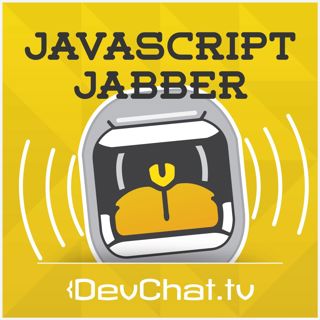
JSJ 388: Functional Programming with Brian Lonsdorf
SponsorsAdventures in BlockchainSentry– use the code “devchat” for $100 credit My Ruby StoryPanelAimee Knight Chris BuechelerAJ O’NealWith Special Guest: Brian LonsdorfEpisode SummaryBrian Lonsdorf works for Salesforce, specializes in functional programming, and wrote a book called Professor Frisby’s Mostly Adequate Guide to Functional Programming. Brian talks about when he got into functional programming and when in their career others should be exposed to it. He talks about the fundamental tenets of functional programming (static mathematical functions), how it differs from object oriented programming, and how to manipulate data in a functional environment. The panel wonders if it is possible to use functional and object oriented programming together and discuss the functional core imperative shell. Brian talks about what is ‘super functional’ and why JavaScript isn’t, but includes methods for making it work. He shares some of the trade-offs he’s found while doing functional programming. Brian defines a monad and goes over some of the common questions he gets about functional programming, such as how to model an app using functional programming. The show concludes with Brian talking about some of the work he’s been doing in AI and machine learning. LinksPromiseFunctional core, imperative shellRxJsMonadProfessor Frisby's Mostly Adequate Guide to Functional Programming Follow DevChat on Facebook and Twitter PicksAimee Knight:After The Burial (band)Chris Buecheler:Minecraft in JavaScriptAJ O’Neal:Crazy Little Thing Called Love by QueenGreenlock v3 campaignBrian Lonsdorf:Follow Brian @drbooleanChris Penner ComonadsSpecial Guest: Brian Lonsdorf. Support this podcast at — https://redcircle.com/javascript-jabber/donationsPrivacy & Opt-Out: https://redcircle.com/privacyBecome a supporter of this podcast: https://www.spreaker.com/podcast/javascript-jabber--6102064/support.
3 Sep 201946min

JSJ 387: How to Stay Current in the Tech Field
SponsorsGitLab | Get 30% off tickets with the promo code: DEVCHATCOMMIT Sentry– use the code “devchat” for $100 credit Views on VuePanelCharles Max WoodJoe EamesEpisode SummaryToday Joe and Charles are discussing how to stay current in the tech field. Since looking at all the new technology can be overwhelming, they advise listeners on what to focus on, which will differ depending on your career. Joe brings up that one of the top reasons people choose a job is because it has a technology they want to learn. Joe and Charles discuss trends in the tech world, such as the rise and fall of Rails. They discuss what to do if you’re happy with what you’re doing now but want your career to stay viable. While it is important to continue moving along with technology, they agree that the stuff that’s really important is the stuff that doesn’t change. Charles believes that if you have a solid knowledge on a subject that isn’t necessary current, that is still very valuable. Joe and Charles discuss the importance of having a learning plan and the importance of having soft skills in addition to technological know-how. Another important part of staying current is figuring out where you want to end up and making a plan. If you want to work for a specific company, you need to learn the technology they’re using. Joe talks about some of his experiences trying to get a job with a big company and how he was reminded of the importance of the fundamentals. They discuss the merits of being a generalist or a specialist in your studies and the best approach once you’ve chosen a technology to learn. Once you’ve learned a technology, it’s important to start building with it. Charles and Joe talk about different ways of learning, such as books, videos, code reading, or tutorials, and the importance of finding a medium that you can understand. They discuss the isolating nature of tutorials and how it is important to have real-world experience with the code. They discuss how to know if you’ve learned a technology well enough to move onto the next thing, and whether the technologies you studies should be career focused or passion based. Charles advises listeners to divide their time as follows: 50% of your learning should be focused on what you’re currently doing at your job, 25% looking towards the future and studying upcoming technology, and 25% on your passion. LinksNodeBackbone Follow DevChat on Facebook and Twitter PicksCharles Max Wood:Rails 6ContainerizationJoe Eames:GatsbySupport this podcast at — https://redcircle.com/javascript-jabber/donationsPrivacy & Opt-Out: https://redcircle.com/privacyBecome a supporter of this podcast: https://www.spreaker.com/podcast/javascript-jabber--6102064/support.
29 Aug 20191h 2min

JSJ 386: Gatsby.js with Chris Biscardi
SponsorsGitLab | Get 30% off tickets with the promo code: DEVCHATCOMMITSentry– use the code “devchat” for $100 credit PanelChris BeuchelerAJ O’NealAimee KnightWith Special Guest: Chris BiscardiEpisode SummaryChris is an independent consultant working with open source startups. He taught himself to program and started in open source. He talks about how he got into programming and how he learned to code. One of Chris’ current clients is Gatsby, a static site generator. Chris talks about his work with Gatsby themes, how he got started working with Gatsby, and how you can get started with Gatsby. Chris talks about how Gatsby differs from other static site generators and how difficult it is to use. The panel discusses possible use cases for Gatsby, and agree that if your site is going to get more complex and larger over time, something like Gatsby is what you want to use. Chris talks about what it’s like to migrate to Gatsby from another service. The panel discusses the pros and cons of server-side rendering. Chris talks about building more app-oriented sites with Gatsby and things that you can plug into a Gatsby theme besides a blog. The show concludes with Chris and the panelists agreeing that if you can write it in JavaScript, you can ship it in a Gatsby theme. LinksGatsbyShadowingDockerReactGraphQLWordPressHugo Follow DevChat on Facebook and Twitter PicksAJ O’Neal:Sam Walton Made America: My StoryCinematic by Owl CityAimee Knight:Some things that might help you make better softwareChris Beucheler:Venture Cafe Providence Chris Biscardi:Jason Lengstorf Twitch showChris’ BlogSpecial Guest: Chris Biscardi. Support this podcast at — https://redcircle.com/javascript-jabber/donationsPrivacy & Opt-Out: https://redcircle.com/privacyBecome a supporter of this podcast: https://www.spreaker.com/podcast/javascript-jabber--6102064/support.
27 Aug 201943min

JSJ 385: What Can You Build with JavaScript?
SponsorsRxJS LivePanelCharles Max WoodChristopher BeuchelerEpisode SummaryToday Charles and Christopher discuss what can you do with JavaScript. They talk about the kinds of things they have used JavaScript to build. They discuss non-traditional ways that people might get into JavaScript and what first drew them to the language. They talk about the some of the non-traditional JavaScript options that are worth looking into. Christopher and Charles talk about some of the fascinating things that have been done with JavaScript, such as Amazon Alexa capabilities, virtual reality, and games. They spend some time talking about JavaScript usage in game creation and building AI. They talk about how they’ve seen JavaScript change and progress during their time as developers. They talk about areas besides web that they would be interested in learning more about and what kinds of things they would like to build in that area. They finish by discussing areas that they are excited to see improve and gain new capabilites. LinksNode.jsWebGLReactReact NativeQuakeTenserFlow.jsWebAssemblyHermes Follow DevChat on Facebook and Twitter PicksCharles Max Wood:InstagramJavaScript Jabber ReccomendationsNew shows: Adventures in Block Chain, Adventures in .NetChristopher Beucheler:Pair programmingVS Code Live ShareSupport this podcast at — https://redcircle.com/javascript-jabber/donationsPrivacy & Opt-Out: https://redcircle.com/privacyBecome a supporter of this podcast: https://www.spreaker.com/podcast/javascript-jabber--6102064/support.
22 Aug 201949min

JSJ 384: FaunaDB: Support for GraphQL and Serverless Development with Evan Weaver
SponsorsSentry– use the code “devchat” for $100 credit PanelCharles Max WoodAJ O’NealJoe EamesAimee KnightWith Special Guest: Evan WeaverEpisode SummaryEvan Weaver is the CEO and cofounder of FaunaDB, a serverless database and a great way to get started with GraphQL. Evan talks about what went into building the FaunaDB and his background with Twitter. FaunaDB arose from trying to fix Twitter’s scalability issues, and the panel discusses scalability issues encountered in both large and small companies. They talk about the difference between transient and persistent data. They discuss how to develop locally when using a serverless database and the importance of knowing why you’re using something. Evan talks about how developing locally works with FaunaDB. He addresses concerns that people might have about using FaunaDB since it is not backed by a tech giant. Evan talks about some of the services FaunaDB offers and talks about the flexibility of its tools. He talks about how to get started with FaunaDB and what the authentication is like. Finally, Evan talks about some well known companies that are using FaunaDB and what they are doing with it. LinksFaunaDBGraphQLNetlifyAWS LambdaApollo.ioSQLJamstack AkkerisGraphile Follow DevChat on Facebook and Twitter PicksCharles Max Wood:Captain SonarCannyJSJ ReccomendationsAimee Knight:Falling in ReverseJoe Eames:BattlestationsEvan WeaverForza MotorsportFollow Evan on Twitter and Github @evanSpecial Guest: Evan Weaver. Support this podcast at — https://redcircle.com/javascript-jabber/donationsPrivacy & Opt-Out: https://redcircle.com/privacyBecome a supporter of this podcast: https://www.spreaker.com/podcast/javascript-jabber--6102064/support.
20 Aug 201951min

JSJ 383: What is JavaScript?
SponsorsRxJS LivePanelCharles Max WoodChristopher BeuchelerAimee KnightEpisode SummaryToday’s episode is an exploration of the question “What is JavaScript?”. Each of the panelists describes what they think JavaScript is, giving a definition for both technical and non-technical people. They talk about how the different layers of JavaScript tie into their definitions. They agree that it’s incorrect to call JavaScript one of the ‘easy’ programming languages and some of the challenges unique to JavaScript, such as the necessity of backwards compatibility and that it is used in tandem with CSS and HTML, which require a different thinking method. They discuss the disdain that some developers from other languages hold for JavaScript and where it stems from. They discuss methods to level up from beginner to mid level JavaScript programmer, which can be tricky because it is a rapidly evolving language. They revisit the original question, “What is Java Script?”, and talk about how their definition of JavaScript has changed after this discussion. They finish by talking about the story they want to tell with JavaScript, why they chose JavaScript, and what is it they are trying to do, create, become through using the language. They invite listeners to share their answers in the comments. LinksJQueryJavaScriptJSONReact.js Follow DevChat on Facebook and Twitter PicksCharles Max Wood:The Dungeoncast Aimee Knight:This Patch of SkyChristopher Beucheler:Silversun Pickups album Widow’s Weeds Andrew Huang YouTube channelSupport this podcast at — https://redcircle.com/javascript-jabber/donationsPrivacy & Opt-Out: https://redcircle.com/privacyBecome a supporter of this podcast: https://www.spreaker.com/podcast/javascript-jabber--6102064/support.
15 Aug 201944min

JSJ 382: Mental Health with Anatoliy Zaslavskiy
SponsorsSentry– use the code “devchat” for $100 credit PanelCharles Max WoodWith Special Guest: Anatoliy ZaslavskiyEpisode SummaryAnatoliy Zaslavsky works for Hover, made framework called Pickle.js, and has been on JavaScript Jabber before. Today Chuck and Anatloliy are talking about the importance of mental health. Anatoliy has Bipolar Disorder, and he talks about what it is and his experience with it and how his manic and depressive episodes have affected him. Thankfully, his employers at Hover have been extremely supportive. Chuck and Anatoliy talk about what people should do when they are suffering from a mental illness so that they can do the things they love again. Some of the best ways of coping with mental health issues are to keep a lifeline out to friends and family, go to a professional therapist, stay on a consistent exercise and sleep pattern, and stay away from substances. They talk about how to support someone that is suffering from a mental illness. Anatoliy talks about some of the symptoms and behavioral changes he has during both manic and depressive episodes and how it has affected him in the workplace. Mental health issues are almost always accompanied by changes in behavior, and Chuck and Anatoliy talk about ways to approach a person about their behavior. Anatoliy gives advice on how to work with your employer while you are suffering from a mental illness. For mental illnesses that aren’t as dramatic as Bipolar Disorder, Anatoliy talks about coping mechanisms such as staying away from triggers, knowing what motivates you and communicating it to your employer, and other practices that have helped him. He talks about some of his triggers and how it has affected his work, both for the better and worse. Finding out what helps you cope and what triggers you is often trial and error, but it can help to talk to other people in your field who struggle with the same mental health issues. Anatoliy talks about the pros and cons of working from home or in an office when you have a mental illness. They finish by talking about a few other points on mental health and resources for those suffering from a mental illness to get the help they need. LinksBipolar disorderPickle.js Ketamine therapyRuby Rogues ep. 142: Depression and Mental Illness with Greg BaugesJSJ 358: Pickle.js Tooling and Developer Happiness with Anatoliy ZaslavskiyNAMIDBS Alliance Follow DevChat on Facebook and Twitter PicksCharles Max Wood:ExpressVPNAnatoliy Zaslavskiy: Contact Anatoliy at toli@toliycodes.com Visit his website tolicodes.comMisu app (in beta)Special Guest: Anatoliy Zaslavskiy. Support this podcast at — https://redcircle.com/javascript-jabber/donationsPrivacy & Opt-Out: https://redcircle.com/privacyBecome a supporter of this podcast: https://www.spreaker.com/podcast/javascript-jabber--6102064/support.
13 Aug 201953min

JSJ 381: Building a Personal Brand with John Sonmez
SponsorsSentry– use the code “devchat” for $100 credit RxJS LivePanelCharles Max WoodChristopher BeuchelerAJ O’NealWith Special Guest: John SomnezEpisode SummaryJohn is the founder of Bulldog Mindset andSimple Programmer, which teaches software developers soft skills, and the author of a couple books. He specializes in creating a personal brand and marketing. He addresses the rumors of him leaving software development and gives an introduction to marketing yourself as a software developer and its importance. The panel discusses their experience with consulting and how marketing themselves has paid off. John talks about the importance of having soft skills. In his opinion, the most important soft skills for programmers are communication, persuasion and influence, people skills and charisma. He talks about highlight those soft skills. The truth is, more and more people are hiring for people skills rather than technical skills. The panel discusses more about the importance of people skills.John talks about ways to build your personal brand. One of the easiest ways is blogging but he talks about other methods like podcasts YouTube, writing books, and others. A key to building a personal brand is choosing something that you can become the best at, no matter how small it is. The panel shares their experiences of what things have gotten them attention and notoriety and talk about how other influential programmers got famous. They talk about interacting with central platforms like Medium and Github. Building a personal brand for software developers is the same as any other personal brand, such as having a consistent message, consistent logos and color schemes, and repeated exposure). Most people in the software world aren’t willing to do what’s necessary to build a personal brand, so it makes you stand out when you do it. John talks about the importance of controlling your image so that companies want to hire you. John gives a brief overview of his course How to Market Yourself as a Software Developer. Click here to cast your vote NOW for JavaScript Jabber - Best Dev Podcast AwardLinksJohn Somnez’s booksData Grid GirlFollow JavaScript Jabber on Facebook and Twitter PicksCharles Max Wood:To Sell is HumanHow to Win Friends and Influence PeopleJohn Somnez: Follow John at bulldogmindset.com and simpleprogrammer.comThe Little Book of StoicismTraining PeaksChristopher Beucheler:Strasborg, FranceAJ O’NealDistant Worlds: Music from Final FantasyParallelsCam SlideSpecial Guest: John Sonmez. Support this podcast at — https://redcircle.com/javascript-jabber/donationsPrivacy & Opt-Out: https://redcircle.com/privacyBecome a supporter of this podcast: https://www.spreaker.com/podcast/javascript-jabber--6102064/support.
8 Aug 20191h 9min






















